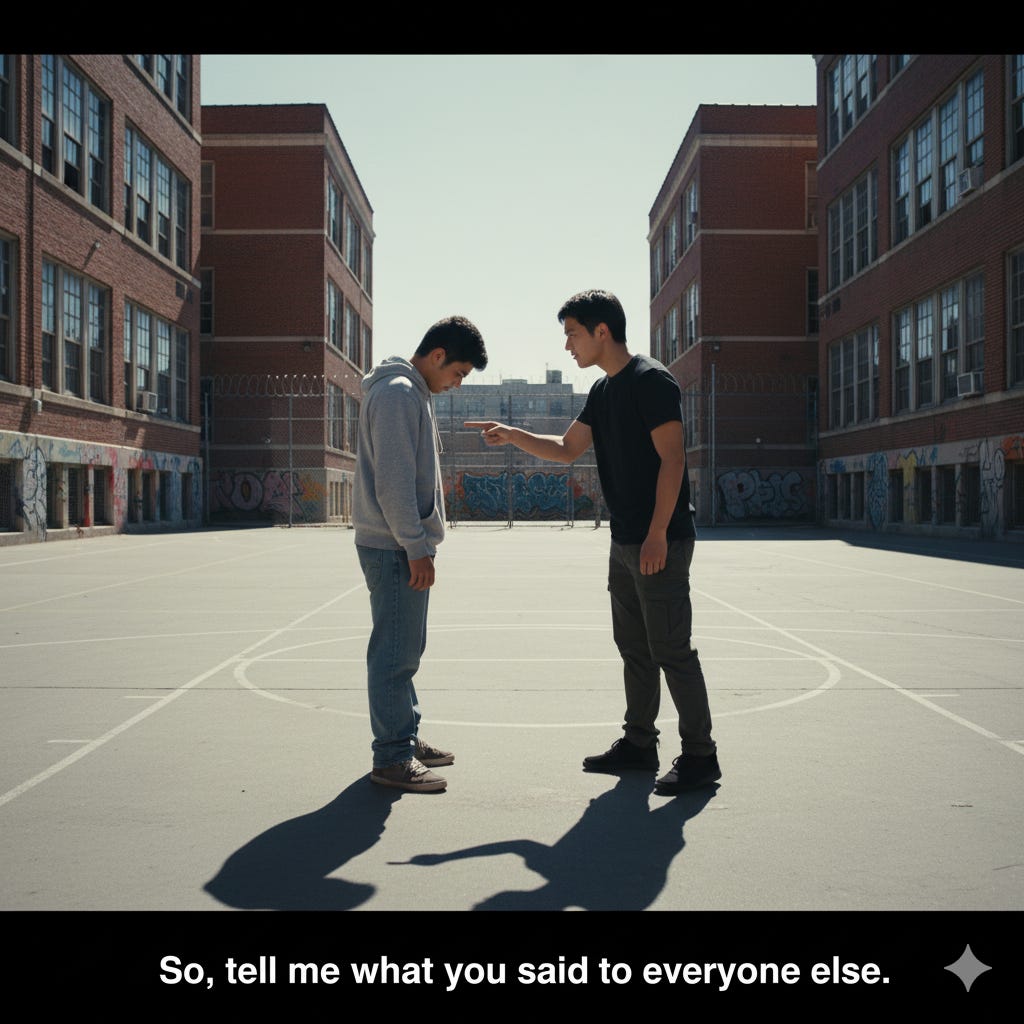Schoolyards and the Myth of Accountability
Blaming another is not accountability, it's a distraction
Image by Gemini AI
Our society has become generationally challenged.
We’ve split our population into groups and assigned them names, like Boomers, Millennials, and Gen Zers, so that we won’t get confused and think our parents or grandparents are from the same generation as us.
We describe each of them differently and assign certain historical events to their watch, usually ones that caused problems for the next generation, to make sure that they understand that it was their fault.
And as a result, each group becomes desperate in their efforts to shift blame from one group to the next. Like a game of musical chairs, they’re intent on not being left standing when the music stops.
Accountability is not a neighborhood we want to live in anymore.
Boomers became responsible for the Vietnam War and the chaos that ensued for decades to come, when the Boomers were the ones being named daily on the wounded and killed in action stats reported on the nightly news.
Millennials are accused of being a lost generation, unfocused and obsessed with pointing fingers at earlier generations for the unmitigated shitstorm they were born into.
Are they wrong?
Accountability has become a state of mind, not unlike happiness. How do we know when we’re close to defining what it really means?
Having a nice home and food on the table, is that happiness?
Having someone walk up to you and admit they were wrong in what they said or did, is that accountability?
We’re equally desperate to locate that tipping point where an entire generation can lean into their mistakes, own them, and help the next generation sort them out.
But accountability as practiced today is a ruse. A false flag operation perpetrated by one side or the other in an effort to move “responsibility” off them and onto someone else.
One team, faction, or political side comes to the podium and demands accountability for some gruesome act that has taken place. They’re devastated, fed up, and will do whatever is necessary to ensure that accountability is found and enforced – usually over there, in the ranks of the other side.
But today, it is far more likely to be a distraction than a sincere effort to resolve a divisive issue.
We’re living in times where words and their definitions are made the cause of problems. Where they’re being blamed for the chaos forming all around us, as if they rose up and uttered themselves. So wherever possible, we alter their meanings to suit our needs.
Let’s look at the word itself and see what it might reveal, while we still can.
Accountability
“…the quality of being responsible for your actions, decisions, and commitments, which includes accepting the consequences and being willing to justify them to others; it involves taking ownership for both successes and failures, ensuring trust and reliability, and is a core component of mature and ethical conduct in personal and professional settings.”
Now, let’s take a look at another word that is often “slipped in” to replace accountability when the other side isn’t looking.
Blame
“To blame is to assign fault or hold someone or something accountable for something bad or wrong. Blaming can be a defense mechanism to avoid facing uncomfortable realities or fears, and it is often linked to feelings of resentment, guilt, and anger. A ‘culture of blame’ encourages destructive behaviors like contempt, defensiveness, and stonewalling, harming relationships and hindering problem-solving. “
As a society, accountability is a fearful condition to have thrust upon one. It’s frightening to have to walk out of the shadows that the Internet and social media provide and declare, It’s my fault, I did it.
When we don’t need to, why should we? Accountability can be a dead stop. It can mean the end of a career. It interferes with a campaign, a cause, a new era being created, because accountability cannot exist without truth.
And truth is problematic. Truth requires open communication lines; unrestricted dialogue, with people actually having to confront and face the object of their scorn and, in turn, deal with the rash of shit and condemnation that will inevitably be heaped upon them because of what they did.
In the “old days,” when accountability was a thing, there was something called schoolyard justice. Two people were heading into the concrete confines of a playground for the sole purpose of sorting things out.
Someone said something nasty. Someone insulted a friend, a mother, or a cherished idol, and they needed to explain themselves, make their case, and be prepared for a response that may be unpleasant.
Schoolyard justice was expected. It was practiced. It was a deterrent that kept frivolous BS to a minimum. It wasn’t the Roman Coliseum; no one died. Football today is far more injurious. But many people changed as a result.
But today we revel in anonymity. We rail against microaggressions and use them to unhinge the truth and put lots of distance between us and what might make a difference. Being up close and personal.
We are empowered by the high walls and impenetrable code of the Internet to say whatever we feel. To slander. To ridicule others and like crabs digging into wet sand as the tide rushes in, we quickly disappear until the next tweet or comment.
We are rewarded mightily for being cowards.
So, what’s the solution?
Unplug the Internet? Dismantle social media?
No. Just stop rewarding those who hide behind hate and insincerity for profit.
Don’t watch them, follow them, pay them, and most of all, don’t listen to them.
Accountability is a glorious state to aspire to if it’s used and not replaced by blame.
Blame has a long history of anger, pain, and injustice associated with it.
It’s not hard to be honest. It just takes courage.

